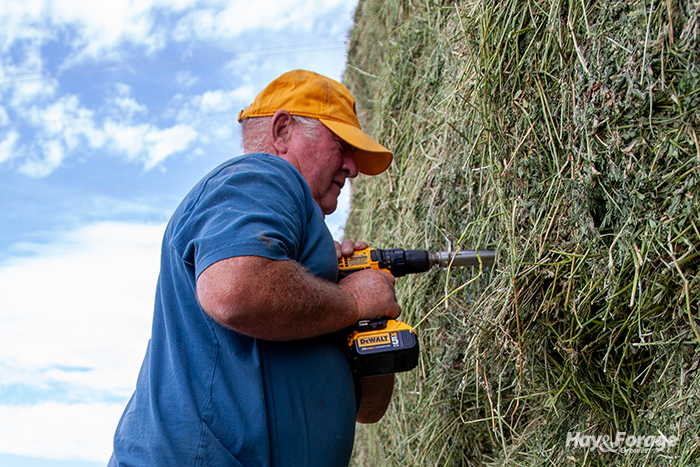
Most inaccuracies of hay test results can be attributed to the fact that the sample taken was not representative of the hay lot.
“Grab samples only represent the quality of about 1 square foot in the field, which doesn’t capture the natural variability across a hay lot,” Mary Drewnoski says. “Quality can vary not only from bale to bale, but also within a single bale, with outer layers often differing from the interior, especially for round bales that have been stored outside.”
Drewnoski, an extension beef specialist with the University of Nebraska, notes that using a hay probe is the only way to obtain a sample that accurately represents a lot of hay. She recommends coring at least 20 different bales, collecting samples that best represent field variation. When the 20 subsamples are combined, the cores should total about one-half pound of forage, providing a reliable sample for testing.
Hay probes differ
Available hay probes differ in design, ease of use, and durability. Drewnoski suggests hay probe buyers consider the following features before making a purchase decision.
Length of the probe: Select a probe 14 to 24 inches long so it will reach well into the bale and sample all layers. Shorter probes risk under-sampling the bale’s interior.
Diameter of the tube: A tube diameter of 3/8 to 5/8 inches works well, according to Drewnoski. Smaller tubes don’t collect enough material, while larger ones can be difficult to push into dense bales.
Cutting edge design: Look for a sharp, hardened, or serrated tip. Blunt or dull edges compress or shred hay, skewing results toward leafy portions. Probes with replaceable tips or ones that can be sharpened are best for long-term use.
Sample collection system: A collection canister or side window makes it easier to empty cores into a sample bag. Avoid probes that require emptying out material each time you probe — they slow the process and may lead to under sampling when fatigue sets in.
Power source: For sampling one lot, hand-driven probes may be adequate. Hand-driven probes are simple, reliable, and always ready. For multiple hay lots or frequent use, probes that attach to a heavy-duty drill can save time and energy, reducing the risk of under-sampling.
Hay probe marketers
Drewnoski offers the following list of companies that manufacture or market hay probes. She points out that this list is not exhaustive and is provided for reference only. For more extensive information on sampling hay, visit the National Forage Testing website.
AMS Hay & Forage Probe
Phone: (800) 635-7330
https://www.ams-samplers.com/hay-sampling/
Best Harvest Hay Sampler Probe
Phone: (888) 947-6226
http://www.bestharveststore.com/Hay-Probe-Samplers-c10
Colorado Hay Probe
Phone: (970) 482-2060
http://www.udyone.com/hayprobeinfo.htm
Oakfield Probe
Phone: (920) 583-4114
https://www.soilsamplers.com/collections/hay-samplers
Penn State Hay Probe
Phone: (607) 252-7540
https://dairyone.com/shop/penn-state-hay-probe-w-drill-adapter/
Sierra Hay Probe
Phone: (209) 333-3337
https://www.sierratestingservice.com/hay-probes
Star Forage Probe
Phone: (403) 471-0097
https://starqualitysamplers.com/forage-samplers/
Yankton Hay Probe (Frontier Mills)
Phone (605) 665-2441
https://frontiermills.com/

